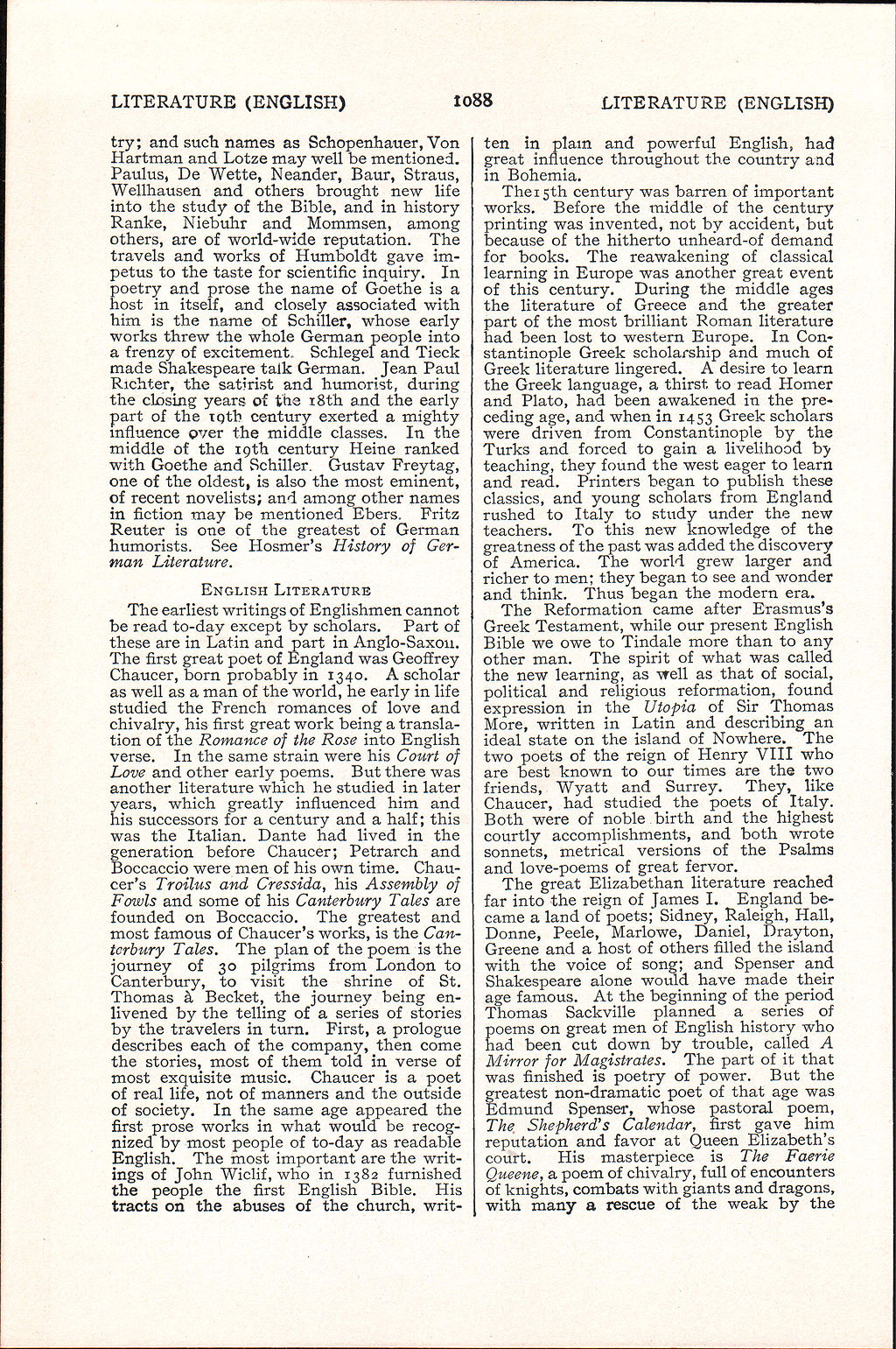try; and such names as Schopenhauer, Von
Hartman and Lotze may well be mentioned.
Paulus, De Wette, Neander, Baur, Straus,
Wellhausen and others brought new life
into the study of the Bible, and in history
Ranke, Niebuhr and Mommsen, among
others, are of world-wide reputation. The
travels and works of Humboldt gave
impetus to the taste for scientific inquiry. In
poetry and prose the name of Goethe is a
host in itself, and closely associated with
him is the name of Schiller, whose early
works threw the whole German people into
a frenzy of excitement, Schlegel and Tieck
made Shakespeare talk German. Jean Paul
Richter, the satirist and humorist, during
the closing years of the 18th and the early
part of the 19th century exerted a mighty
influence over the middle classes. In the
middle of the 19th century Heine ranked
with Goethe and Schiller. Gustav Freytag,
one of the oldest, is also the most eminent,
of recent novelists; and among other names
in fiction may be mentioned Ebers. Fritz
Reuter is one of the greatest of German
humorists. See Hosmer's History of German
Literature.
English Literature
The earliest writings of Englishmen cannot be read to-day except by scholars. Part of these are in Latin and part in Anglo-Saxon. The first great poet of England was Geoffrey Chaucer, born probably in 1340. A scholar as well as a man of the world, he early in life studied the French romances of love and chivalry, his first great work being a translation of the Romance of the Rose into English verse. In the same strain were his Court of Love and other early poems. But there was another literature which he studied in later years, which greatly influenced him and his successors for a century and a half; this was the Italian. Dante had lived in the generation before Chaucer; Petrarch and Boccaccio were men of his own time. Chaucer's Troilus and Cressida, his Assembly of Fowls and some of his Canterbury Tales are founded on Boccaccio. The greatest and most famous of Chaucer's works, is the Canterbury Tales. The plan of the poem is the journey of 30 pilgrims from London to Canterbury, to visit the shrine of St. Thomas à Becket, the journey being enlivened by the telling of a series of stories by the travelers in turn. First, a prologue describes each of the company, then come the stories, most of them told in verse of most exquisite music. Chaucer is a poet of real life, not of manners and the outside of society. In the same age appeared the first prose works in what would be recognized by most people of to-day as readable English. The most important are the writings of John Wiclif, who in 1382 furnished the people the first English Bible. His tracts on the abuses of the church, written in plain and powerful English, had great influence throughout the country and in Bohemia.
The 15th century was barren of important works. Before the middle of the century printing was invented, not by accident, but because of the hitherto unheard-of demand for books. The reawakening of classical learning in Europe was another great event of this century. During the middle ages the literature of Greece and the greater part of the most brilliant Roman literature had been lost to western Europe. In Constantinople Greek scholarship and much of Greek literature lingered. A desire to learn the Greek language, a thirst to read Homer and Plato, had been awakened in the preceding age, and when in 1453 Greek scholars were driven from Constantinople by the Turks and forced to gain a livelihood by teaching, they found the west eager to learn and read. Printers began to publish these classics, and young scholars from England rushed to Italy to study under the new teachers. To this new knowledge of the greatness of the past was added the discovery of America. The world grew larger and richer to men; they began to see and wonder and think. Thus began the modern era.
The Reformation came after Erasmus's Greek Testament, while our present English Bible we owe to Tindale more than to any other man. The spirit of what was called the new learning, as well as that of social, political and religious reformation, found expression in the Utopia of Sir Thomas More, written in Latin and describing an ideal state on the island of Nowhere. The two poets of the reign of Henry VIII who are best known to our times are the two friends, Wyatt and Surrey. They, like Chaucer, had studied the poets of Italy. Both were of noble birth and the highest courtly accomplishments, and both wrote sonnets, metrical versions of the Psalms and love-poems of great fervor.
The great Elizabethan literature reached far into the reign of James I. England became a land of poets; Sidney, Raleigh, Hall, Donne, Peele, Marlowe, Daniel, Drayton, Greene and a host of others filled the island with the voice of song; and Spenser and Shakespeare alone would have made their age famous. At the beginning of the period Thomas Sackville planned a series of poems on great men of English history who had been cut down by trouble, called A Mirror for Magistrates. The part of it that was finished is poetry of power. But the greatest non-dramatic poet of that age was Edmund Spenser, whose pastoral poem, The Shepherd's Calendar, first gave him reputation and favor at Queen Elizabeth's court. His masterpiece is The Faerie Queene, a poem of chivalry, full of encounters of knights, combats with giants and dragons, with many a rescue of the weak by the
